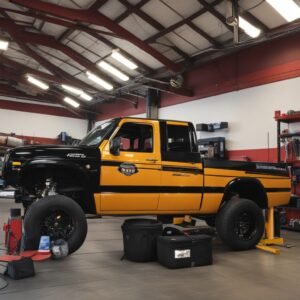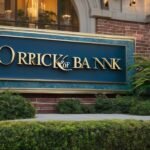Providing loans to finance necessary auto repairs is an important service for Modo customers. However, these short-term loans also present distinct risk management considerations. An effective loan review process is essential to ensure prudent lending practices while still providing accessible financing options. This article will provide an overview of key aspects in Modo’s auto repair loan program, including:
- Evaluating borrower qualifications and repayment capacity
- Establishing prudent loan terms and approval criteria
- Managing risks and dealer relationships
- Monitoring portfolio performance
- Maintaining strong compliance and fraud prevention
By balancing responsible underwriting with efficient systems and processes, Modo can deliver a positive customer experience for auto repair financing while also mitigating credit risk for the bank. This article aims to cover critical components of our loan review procedures and approach to managing this unique lending segment. Our goal is maintaining a healthy portfolio that meets customer needs while upholding sound risk management principles.
Overview of Auto Repair Loans
Before diving into Modo’s loan review process, let’s get on the same page about auto repair loans and how they work.
These short-term financing products help customers pay for critical auto repairs like:
- Engine or transmission replacements
- Major part failures (e.g. radiator, alternator)
- Collision repairs after an accident
Often repairs hit at inconvenient times and the bill is too large to pay upfront. Repair loans fill this need.
At Modo, our loans:
- Range from $500 – $5,000
- Have terms of 12-24 months
- Carry fixed interest rates around 6-12%
This provides affordable financing so customers can get their cars fixed and back on the road.
We partner with auto repair shops and dealerships to offer loan applications right at the point of service. Funds go directly to the shop.
Repair loans are secured by the vehicle itself, giving Modo collateral. We can file a mechanic’s lien if needed.
While these loans are higher risk due to the borrower profile, our prudentreview process balances accessibility with sound lending practices.
Now that we’ve aligned on what auto repair loans are, we can dive into the specifics of Modo’s approach to managing risks for this unique product. Evaluating borrowers’ financial condition is the first step…
Evaluating Borrower Qualifications
Now let’s dive into how Modo evaluates borrowers for auto repair loans. We take a balanced approach – assessing both ability and willingness to repay while also providing access to customers in need.
Some key factors we look at:
- Credit history – we check credit reports to review payment history, utilization, open accounts, etc. This provides insight into how responsible they manage obligations.
- Income – applicants must document steady employment income. We verify details like length of employment. Self-employed individuals provide past tax returns.
- Existing obligations – we tally monthly bills to calculate debt-to-income ratio. A manageable ratio indicates capacity to take on the new repair loan payment.
- Collateral – we research the vehicle’s value using pricing guides to establish loan-to-value ratio. If the car is too old or high mileage, we may decline the application.
While credit scores and reports are important, they aren’t the only factors. We also look beyond the data to understand the customer’s unique situation. Our loan officers can identify creditworthy borrowers even with past issues.
With an efficient underwriting process, we can assess applications quickly without sacrificing diligence. This provides customers a fast financing experience while giving Modo the details we need to evaluate qualifications.
Now that we understand the borrower’s profile, we can determine appropriate loan terms and structure…
Loan Approval Considerations
Once we’ve vetted the applicant, it’s time to decide on the specific auto repair loan terms. Our goal is striking the right balance between serving the customer’s needs and managing risk.
Some key approval considerations:
- Loan amount – we benchmark against repair estimates and set a maximum based on the vehicle value. Capping the loan amount controls exposure.
- Interest rate – we price based on the applicant’s risk profile. More creditworthy borrowers qualify for lower rates. This incentivizes maintaining good credit.
- Fees – our application fee and processing fees are competitive. We aim to recover costs rather than generate revenue.
- Term length – 12 to 24 month terms provide affordable payments while minimizing defaults. Shorter durations may strain borrowers.
- Payment date – aligning due dates with pay cycles improves collections. Weekly or bi-weekly payments work best.
- Collateral requirements – we secure the loan against the repaired vehicle by filing liens with the DMV.
- Co-signers – for riskier applicants, requiring a co-signer can provide extra assurance. We consider co-signers’ credentials too.
- Documentation – we collect all required legal disclosures and the repair invoice while avoiding unnecessary paperwork hassles.
By fine-tuning approval criteria, Modo attracts creditworthy borrowers with appropriate terms while also upholding prudent, consistent underwriting standards. This minimizes portfolio risk down the line.
Now, let’s discuss how we keep close tabs on these auto repair loans…
Risk Management
Responsible lending requires diligent risk management throughout the auto repair loan lifecycle. Here are some of the ways Modo maintains a healthy portfolio:
- Repayment capacity analysis – we don’t just evaluate ability to pay at origination. We also monitor for potential changes in income that could impact capacity.
- Loan covenants – covenants like maintaining insurance protect our interests. We track compliance.
- Payment monitoring – we watch closely for signs of early delinquency and contact borrowers to discuss hardships. Payment patterns inform risk ratings.
- Credit bureau reporting – consistently reporting loan details helps incentivize repayment and improves our ability to evaluate capacity for future borrowing.
- Collateral tracking – we file liens on vehicles and may reassess value if loans become delinquent. The vehicle serves as our backup source of repayment.
- Default management – for past due accounts we attempt to work with borrowers to get them back on track before pursuing collection actions.
- Recoveries – when defaults occur, we efficiently repossess vehicles and liquidate them through certified dealers to maximize recoveries.
- Loss forecasting – by segmenting risk pools and projecting expected losses, we appropriately price for risk and reserve sufficient capital.
Proactive risk management is essential because an auto’s condition and value can change quickly. Close monitoring provides early warning signs to mitigate losses. Our balanced approach limits credit exposure while still providing this valuable lending product.
Next let’s review how we partner closely with repair shops on origination…
Auto repair shops and dealerships are instrumental partners for our auto repair loan program. Aligning with shops on the front end improves service for customers and mitigates risks.
We establish relationships through dealer agreements that outline:
- Loan application and funding process
- Responsibilities of each party
- Performance expectations and metrics
- Commission structures
Key areas we align on:
- Point of sale system integration – this allows seamless application initiation when the customer checks out after service.
- Loan decision timing – we commit to rapid decisions to avoid delays and uncertainty.
- Repair invoice verification – the shop sends us the invoice detailing service work performed to justify loan amount.
- Funds disbursement – we send approved loan funds directly to the shop quickly after work is complete.
Ongoing performance monitoring helps identify issues early:
- Loan volume – low volume could signal weak program promotion or channel conflict
- Pull through rate – the percentage of applications submitted that result in an approved loan
- Customer satisfaction – feedback indicates gaps like decision delays or poor promotion
Proactive relationship management is essential because the dealer serves as the face of our loan program to the consumer. Smooth coordination delivers fast, transparent service while also keeping our interests aligned.
Next let’s discuss portfolio monitoring…
Portfolio Monitoring and Reporting
Ongoing monitoring and reporting helps Modo manage risks and optimize our auto repair loan program. We analyze key portfolio metrics to identify trends and areas for improvement.
Examples of what we track:
- Loan volume and growth – are we achieving lending targets? Is demand aligned to projections?
- Book quality – monitoring metrics like delinquencies, charge offs, and recovery rates informs health.
- Loss forecasting – we update loss rate projections based on actuals to fine tune reserve levels.
- Dealer-level performance – we dissect figures like default rates, loan amounts, and decisions by partner to spotlight outlier shops.
- Operational metrics – conversion rates, decision times, and funding lag are examples. This indicates process efficiency.
- Risk model performance – we verify scoring and underwriting criteria are predicting repayment ability accurately across customer segments.
Consolidated reporting provides visibility into these key indicators. Trends inform strategic decisions like:
- Adjusting approval criteria if losses increase
- Identifying high-performing dealer partners for expanded business
- Revising workflow if decision times are lagging
- Shifting investment away from low-potential geographies
Proactive monitoring safeguards Modo by detecting adverse trends early. Analytics also guide us toward growth opportunities. Reporting and review keeps our program aligned to industry best practices.
Let’s now discuss how we stay atop of an evolving market…
Adapting to Industry Trends
The automotive and lending landscapes are constantly evolving. Modo proactively adapts our auto repair loan program to align with market shifts:
Vehicle changes – As new cars become more complex, repair costs rise. We account for higher loan demand and balances. Partnerships with dealerships specializing in newer models is key.
Repair cost inflation – Labor, parts, and materials pricing fluctuates. We factor in cost inflation when projecting loan sizes and payments ability. Risk models are re-calibrated accordingly.
Consumer expectations – Customers expect speed, transparency, and convenience. Our application process, decision timing, and tools must align. Dealers provide a seamless financing experience.
Competitor offerings – We monitor other lenders’ products, fees, risk appetite and automation. Maintaining competitive loan terms and decisive underwriting is vital to attracting dealer partnerships in a dynamic market.
Economic conditions – External factors like high gas prices or recession impact repair demand and the customer’s ability to repay. We adjust approval criteria, loan sizes, and loss reserves based on the environment.
Regulations – Compliance requirements evolve around fair lending, disclosures, and account management. We update policies and systems to comply with new regulations.
Technology innovation – Emerging data sources, decision models, and automation can improve underwriting and borrower experience. We actively pilot new technologies that drive efficiency while maintaining strict governance.
By staying agile, Modo responds quickly when market forces and trends shift. Our focus remains on responsible lending, stellar customer service, and creating dealer partnerships that stand the test of time.
Compliance Requirements
Maintaining rigorous compliance is essential for our auto repair loan program. We uphold strict standards across:
- Fair lending – Our underwriting uses objective criteria and required documentation. We routinely analyze outcomes across applicant segments to ensure consistent decisions.
- Disclosures – We provide transparent terms and required loan disclosures upfront so customers understand costs. This builds trust.
- Data privacy – We protect applicant personal and financial information through encryption, access controls, and vendor agreements.
- Record keeping – We retain loan documentation per regulatory requirements. This supports compliance audits and borrower inquiries.
- Account management – We follow fair collections practices and statement mailing timelines. Billing cycle tracking prevents errors.
- Regulator coordination – Proactively engaging with agencies like the CFPB keeps us atop of pending regulatory changes.
- Compliance training – Annual refreshers ensure staff understand latest requirements and proper practices.
- Testing – Self-assessments proactively detect gaps, particularly when modifying procedures or systems. Third party audits provide independent assurance.
- Issue documentation – Any compliance violations or customer complaints are thoroughly investigated and documented to support corrective actions.
Upholding strong governance protects customers and our reputation. It also keeps issues from escalating into larger problems down the road. Integrating compliance across departments results in responsible and sustainable lending.
Let’s now discuss ways we can continue enhancing our auto loan review process…
Process Improvement
While our auto repair loan program is robust, we actively pursue continuous enhancements. Some ways we refine:
- Lean principles – We analyze steps in our application-to-funding workflow to identify inefficient hand-offs, delays, and redundant steps. Streamlining improves turn times and experience.
- Benchmarking – We study metrics from top lenders to compare decision speed, loss rates, and borrower satisfaction. This reveals improvement opportunities to reach best-in-class status.
- Risk modeling – We consistently fine tune our underwriting criteria and scoring algorithms based on the latest repayment data. This enhances predictive accuracy.
- Dealer feedback – Partner shops provide insights on borrower pain points and ideas to smooth the financing process. Their input drives upgrades.
- Employee suggestions – Frontline teams often recognize process friction points. We gather input through surveys and meetings.
- Customer journey mapping – Tracking each step of the borrower experience exposes hurdles and highlights emotions. Enhancements address pain points.
- Test and learn – We pilot process changes through controlled tests before scaling improvements. This ensures enhancements yield intended benefits.
Ongoing improvement is key to providing an efficient customer financing experience as consumer expectations and the market evolve. Our commitment to optimizing sets Modo apart.
In summary, our rigorous approach to auto repair loans balances diligent risk management with customer accessibility. We take pride in providing vital financing options to get customers’ vehicles repaired quickly, safely, and affordably.
Fraud Prevention
With any lending product, fraud is a risk we actively monitor and mitigate. Some ways we detect and prevent fraud with auto repair loans:
- Application screening – We validate employment details and income sources provided. Cross-checking names, addresses, phone numbers, etc. spots inconsistencies.
- Dealer diligence – We assess repair shop credibility through background checks and monitoring unusual volume trends. This uncovers potential shop collusion.
- Documentation review – Invoice tampering like inflated repair costs is easier to catch through diligent review before funding loans.
- Data analytics – Statistical analysis flags anomalous trends that may signal potential fraud schemes. This alerts our investigations team.
- Forensic tools – Solutions scan loan data to identify application characteristics common in confirmed fraud. Models improve detection rates.
- Suspicious activity monitoring – Rapid loan payoffs or customer payments from unrelated parties raise red flags of potential money laundering.
- Borrower behavior tracking – Repeat applicants, especially across dealer panels, warrant closer review and could be abusing loans.
- Staff training – Annual education on fraud schemes and warning signs keeps all employees vigilant. Cash incentives for employee tips further bolster detection.
- Fraud response protocols – When uncovered, expedited criminal referral and coordinated process with law enforcement aid prosecution.
With proactive controls and collaboration across departments, we mitigate fraud while providing a smooth financing experience for legitimate customers. Our prevention program protects Modo and our loyal partners.
Let’s now recap some key takeaways…
Conclusion
In closing, Modo’s commitment to responsible auto repair lending is evident throughout our diligent loan review process. By taking a balanced approach, we provide vital financing access to customers in need while upholding sound risk management principles.
Key highlights include:
- Thorough evaluation of a borrower’s qualifications and capacity to repay
- Customized loan terms, amounts, and structure based on individual risk profiles
- Proactive portfolio monitoring and risk mitigation practices
- Strong dealer partnerships to deliver smooth customer service
- Adapting to auto repair market trends and innovations
- Rigorous compliance and fraud preventioncontrols
- Ongoing process enhancements through analytics and optimization
Our expertise in short-term secured lending enables us to deliver great customer experiences. Partnerships with top repair shops get drivers safely back on the road.
While no lending is risk-free, our prudent practices allow healthy portfolio growth. We take pride in providing access to affordable financing so customers can complete critical vehicle repairs.
Modo’s commitment to compliance, transparency, and customer service makes us a trusted lender. We balance business priorities with community responsibility. Our reputation demonstrates that auto repair loans, when managed properly, can be a win-win value proposition.

seeesan is a passionate finance writer who specializes in creating in-depth reviews, comparisons, and guides focused on loans, credit cards, banks, and other financial products.
With over 7 years experience analyzing the fine print and key details that matter most to consumers, seeesan founded Loans Reviewer as the premier destination for straightforward analysis on all things loans and lending. Site also covers adjacent personal finance topics that equip readers to maximize savings and make smarter borrowing choices.
Drawing on a background in financial risk analysis and consumer research, seeesan takes pride in demystifying complex money matters through educational, easy to digest writing. Strongly believes financial literacy and transparency drive better decision making.










